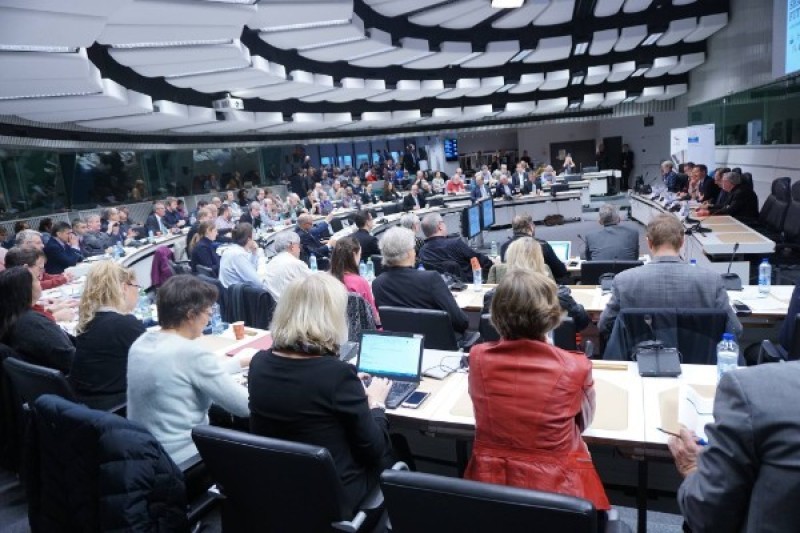A full house at the European Economic and Social Committee for the Shaping the Future of Work conference, addressing challenges like digitalisation, globalisation, and artificial intelligence. Photo: CEC/Erin Green
Press Release No: 18/36
27 November 2018
Brussels
On Tuesday, 27 November, nearly 200 people gathered at the European Economic and Social Committee for “Shaping the Future of Work,” a conference addressing new challenges, while also looking forward to the 100th anniversary of the International Labour Organization next year.
The CALL (Church Action on Labour and Life) Network of the Conference of European Churches organised the event in cooperation with the Commission of the Bishops’ Conference of the European Union (COMECE), other Catholic partners, the Evangelical Church in Germany (EKD), and the International Labour Organization. The conference also had an interfaith dimension, with representation from Jewish and Muslim communities.
Presentations and discussion contributed to ongoing debates about extraordinary changes in work as a result of digitalisation, automation, robotisation and advances in artificial intelligence. The ongoing climate crisis also informed this exchange.
Both Christians and representatives from other religions advocated putting people at the centre in dealing with transitions in work. Labour is not only about material wellbeing, but should remain a place where a person can flourish, serve society, and care for Creation. Paid work—along with labour in the home and volunteer commitments—should empower people to actively participate in society. In this view, new technologies might offer liberation from dangerous, tiring, or boring work.
The future of the social protection system, which in many countries is related to personal income and the workplace, was also the subject of lively debate. Education will have to adapt and guarantee that as many people as possible have access to the “new” world of labour, and tax systems have to allow for all members of a society to lead a dignified and decent life.
CEC President Rev. Christian Krieger concluded, “The conference has proven that Christianity and religious traditions can contribute substantially to the essential discussion on the future of work. We as people and as a society have to shape the future of work together, and not leave it to automatic, uncontrollable dynamics. This is all the more pressing as we consider our responsibility to care for Creation and be responsible stewards of our planet’s limited resources.”#
Other contributions from the CALL Network included:
- Dean Satu Saarinen, Cathedral of Oulu, Evangelical Lutheran Church of Finland
- Rev. Dr Kari Latvus, Senior Adviser for Society, Work, Public Theology, Digital Media at the National Church Council - Worship and Society, Evangelical Lutheran Church of Finland (Member of the CALL Coordination Team)
- Prof. Dr Radu Preda, Chair of Orthodox Social Theology, University of Cluj-Napoca, Romania
For the complete programme from the conference, please click here.
For more information or an interview, please contact:
Dr Erin Green
Communication Coordinator
Conference of European Churches
Rue Joseph II, 174 B-1000 Brussels
Tel. +32 2 234 68 42
Fax +32 2 231 14 13
E-mail: eeg@cec-kek.be
Website: www.ceceurope.org
Facebook: www.facebook.com/ceceurope
Twitter: @ceceurope
